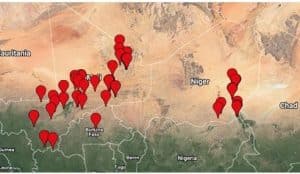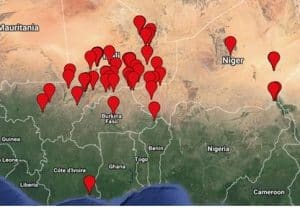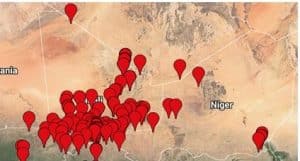African Union Warns IS Foreign Fighters Headed to Africa
December 17, 2017 in Africa, al-Qaeda, IS, Islamic StateReports have emerged that up to 6,000 Africans who fought for the so-called Islamic State (IS) are making their way back to Africa after the group was forced out of territory previously held in Syria and Iraq. The threat posed by IS militants was raised on 11 December 2017 during a meeting on counter-terrorism organized by the African Union (AU) and Algeria. The AU’s top security official called on regional countries to prepare. The report comes as the G5 Sahel is launching operations in the West African region amidst an increase in terrorist activity in the past year.
Smaïl Chergui, the AU’s commissioner for peace and security, told the meeting “there are reports of 6,000 African fighters among the 30,000 foreign elements who joined this terrorist group in the Middle East.” He warned that African countries will need to work closely with one another to share intelligence in order to counter returning militants.
After IS seized vast swathes of Iraq and Syria in 2014, tens of thousands of foreigners joined the terrorist group. However, in the last year, IS has suffered a string of losses to both its territory and military capabilities. Earlier this month, Iraq declared that the country was had been liberated from IS’ control. In Syria, the terrorist group remains under pressure. The squeeze on IS in Iraq and Syria has sparked concerns that its remaining foreign fighters will return home to spread their ideology or conduct extremist actions.
Africa’s Fragile Security Situation
Africa’s security situation remains fragile as a number of countries are battling insurgencies led by major terrorist groups with links to al-Qaeda and IS. Continued insecurity in Libya and Mali, along with insurgencies in Somalia and Nigeria, have transformed areas of the continent into breeding grounds for jihadi activity – resulting in regional instability. Fighters with weaponry are able to move with relative ease through the porous borders. These regional conflicts have also spilled across borders, and have begun to impact stable nations.
In Nigeria, Boko Haram’s nine-year insurgency has continued, despite the Nigerian government’s announcements on numerous occasions that the terrorist group has been defeated. Although the number of attacks in the northeastern region of the country has significantly declined in the last year, and Boko Haram no longer controls major areas, suicide bombings continue to target mosques, markets and other soft targets. The Far North region of Cameroon and the southern Diffa region of Niger have been impacted by Boko Haram violence. In Somalia, al-Shabaab has remained active, and in October the group launched their deadliest attack – a truck bombing in the capital Mogadishu that killed over 500 people. The United States has carried out dozens of airstrikes targeting senior al-Shabaab commanders this year, however the central government in Mogadishu has minimal control outside the capital. Al-Shabaab has continued to launch attacks near the border regions with Kenya.
In West Africa, the continued situation in Mali has increasingly impacted security across the region. Fighting has spilled as terror groups launch attacks in Ivory Coast, Burkina Faso, and Niger. In 2015, at least 81 incidents of terrorism were reported in Burkina Faso, Mali, and Niger, with most incidents occurring in Mali. In 2016, this figure decreased slightly to 70 incidents, yet regional terrorist groups proved their operational capabilities by launching a major attack in Grand Bassam Ivory Coast in March of that year. In 2017, the number of terrorist incidents has nearly doubled from 2016, with at least 132 attacks reported as of 15 December. Furthermore, the northern Sahel region in Burkina Faso has seen a sharp rise in extremist activity this year, as terrorist groups operating in the area increasingly target local communities.
2015 – 81 Terrorist Incidents reported; most activity occurring in Mali
2016 – 70 terrorist incidents reported. While activity slightly declined, groups are becoming bolder, launching major attacks in countries not previously threatened by terrorism, like Ivory Coast
2017 – 132 incidents reported as of 15 December, with a major expansion of reported incidents in the southern region of Mali, northern area of Burkina Faso, and western Niger.
The African continent is now under increased threat from a battle between IS and al-Qaeda, as both terror groups seek to gain influence in the region. This battle has already begun; IS aims to find new territory after suffering major losses in Iraq and Syria, and al-Qaeda aims to secure its future on the African continent by expanding its operations into countries previously unaffected by terror, and forming alliances in the sub-Saharan region.
IS influence on the African continent has increased in recent years – Boko Haram has split, with one faction continuing under the al-Qaeda banner and another pledging allegiance to IS. Similarly in Somalia, a small group of IS fighters have emerged and launched attacks in the Puntland region, though officials have indicated that their influence remains minimal. Al-Qaeda has also sought to expand their influence, and have used Mali’s continued insecurity to their advantage. New groups have emerged along the southern Malian border with Burkina Faso and Niger. These groups have proven to be deadly as they have launched attacks on the local communities, kidnapping and killing locals as they attempt to spread their ideology.
While the G5 Sahel operation is a sign that West African leaders are aware of the threat posed by terrorist groups operating in the region, its impact remains to be seen as funding issues have impacted the operation.
Islamic State Calls for More Attacks During Ramadan
June 20, 2017 in IS, ISIS, Islamic StateAn audio message released this week purporting to come from the spokesman of the so-called Islamic State (IS) group called on followers to launch attacks in the United States, Europe, Russia, Australia, Iraq, Syria, Iran and the Philippines during the Islamic holy month of Ramadan, which began late last month.
The audio clip was distributed on Monday 12 June on IS’ channel on Telegram, which is an encrypted messaging application. The audio was attributed to the militant group’s official spokesman, Abi al-Hassan al-Muhajer. While the authenticity of the recording has not yet been independently verified, the voice was the same as a previous audio message purported to be from the spokesman.
Islamic State Group “Lost Quarter of Territory” in 2016
February 1, 2017 in IS, ISIS, Islamic StateAccording to new analysis, the so-called Islamic State (IS) group lost almost a quarter of its territory in 2016.
Security and defense analysts IHS Markit have reported that last year, the terrorist group gave up almost 18,000 sq km (6,900 sq miles), with its territory effectively reducing to some 60,400 sq km, just less than the size of the US state of Florida. According to IHS Markit, the 23% reduction in IS-held territory in 2016 followed on from a 14% loss in 2015.
IHS Market predicted the recapture of Mosul by Iraqi government forces by the middle of the year, nothing that the stronghold of Raqqa would be more difficult to recapture. What is also troubling is that IS retook the city of Palmyra in December 2016.
The report also highlighted what it said was a major theological dispute within IS, between those following mainstream doctrine and those taking a more radical interpretation, noting that this could raise the risk of defections or even cause an internal break-up.
After a Series of Setbacks, IS Launches String of Deadly Attacks in Syria
September 15, 2016 in Iraq, IS, ISIS, Islamic State, SyriaIn recent weeks, the so-called Islamic State (IS) group has suffered a series of setbacks in Syria, including the loss of access to the Syria-Turkey border and the killing of a number of top leaders. Analysts however warn that the terrorist group remains a potent force – a fact that has been demonstrated by a series of deadly attacks.
The growing pressure on IS, which includes Turkey’s decision to launch an operation against it in northern Syria, has seen the militant group lose ground at an unprecedented pace. IS however continues to maintain the capacity to obtain weapons, attract recruits and deploy fighters to carry out devastating attacks abroad.
On 4 September, the Turkish operation reclaimed the last stretch of the Syria-Turkey border from IS, effectively sealing off its self-styled “caliphate” in Syria and neighbouring Iraq and forcing the group to rely on smuggling networks instead. For IS, this was just the latest setback as the group is now under attack from Syrian and Iraqi troops, as well as Kurdish fighters, Syrian rebels, Turkish Forces, Russian warplanes and a US-led coalition. Experts believe that IS now controls just 20 percent of Iraq and 35 percent of Syria. At the height of its expansion, after it seized Syria’s Palmyra in May 2015, IS controlled around 240,000 square kilometres (more than 92,000 square miles) in both countries – an area roughly the size of Britain. Today however experts indicate that this number has fallen by more than a third to around 150,000 square kilometres, adding that the population it now controls has also declined from some eight million people in mid-2015 to 4.5 million people today. In another major blow to the group’s mobility, in August, IS lost Jazirat al-Khaldiyeh, an area in Iraq’s western Anbar province that was a key crossroads. Meanwhile in Libya, IS is on the verge of losing its stronghold of Sirte. Along with the territorial losses, IS has been affected by a number of high-profile assassinations of its key leaders, which include senior commander Omar al-Shishani and spokesman and top strategist Abu Mohamed al-Adnani.
While these setbacks paint a picture that IS is on the decline, analysts are increasingly warning that the group is far from finished, noting that its focus may simply be shifting from territorial expansion to consolidation of population centres, such as Syria’s Raqa and Iraq’s Mosul, and to launching new attacks against civilians in the region and the West. IS has proven capable of adapting to the changing territory, and it likely that it will do the same this time around. The loss of the border with Turkey will hamper the group’s abilities to import new weapons and recruits, as well as to export resources such as oil. However this challenge is hardly a new one as pressure from Kurdish forces coupled with a Turkish crackdown on the border had already forced IS to mainly rely on smuggling networks. In regards to attaining weapons, IS has always relied to some degree on purchasing from corrupt individuals among its enemies, or capturing arms from defeated opponents.
Key Islamic State Leader Killed in Syria
September 1, 2016 in Islamic StateThe so-called Islamic State (IS) group confirmed on 30 August that one of its most prominent and longest-serving leaders, Abu Muhammad al-Adnani, was killed in what appears to be an American air strike in Syria, effectively depriving the militant group of the man in charge of directing attacks overseas.
IS’ Amaq News Agency has reported that Adnani was killed “while surveying the operations to repel the military campaigns against Aleppo.” While IS holds territory in the province of Aleppo, it does not control the city, where rebels are fighting Syrian government forces. Amaq did not say how Adnani, born Taha Subhi Falaha in Syria’s Idlib Province in 1977, was killed, however it did publish a eulogy dated 29 August. A US defense official has also disclosed that the United States targeted Adnani in a Tuesday strike on a vehicle that was travelling in the Syrian town of al-Bab. The official however stopped short of confirming Adnani’s death. Such US assessments usually take several days to confirm and often lag behind official announcements made by militant groups.
Adnani was one of the last living senior members of IS, along with self-appointed caliph Abu Bakr al-Baghdadi, who founded the group, which would later go on to seize huge parts of Iraq and Syria in 2014. He was a Syrian from Binish in Idlib, southwest of Aleppo, who pledged allegiance to IS’ predecessor, al-Qaeda, more than a decade ago. He was once imprisoned by US forces in Iraq. He was from a well-to-do background however he left Syria to travel to Iraq in order to fight US forces there after the 2003 invasion. He returned to his homeland after the start of its own civil war in 2011. According to the Brookings Institution, he once taught theology and law in jihadi training camps. He had been the chief propagandist for IS since he declared in a June 2014 statement that it was establishing a modern-day caliphate spanning swaths of territory that it had seized in Iraq and neighbouring Syria. As IS’ spokesman, Adnani was its most visible member, often being the face of the militant group, such as when he issued a message in May urging attacks on the US and Europe during the holy month of Ramadan and as in September 2014, when he called on supporters to kill Westerners throughout the world. As the group’s head of external operations, he was in charge of attacks overseas, including in Europe, which this year have become an increasingly important tactic for the group as its core Iraqi and Syrian territory has ben eroded by military losses. Under Adnani’s auspices, IS launched large-scale attacks, bombings and shootings on civilians in countries outside its core area of operations, including France, Belgium and Turkey. According to one US official, Adnani’s roles as propaganda chief and director of external operations had become “indistinguishable” because the group uses its online messages in order to recruit fighters and to provide instruction and inspiration for attacks.
According to SITE Intelligence monitoring group, which monitors jihadist activity online, a statement in the group’s al-Naba newspaper has indicated that the group reacted by stated that his death would not harm it and that his killers would face “torment,” adding “today, they rejoice for the killing…and then they will cry much when Allah will overpower them, with His permission, with affliction of the worst torment by the soldiers of Abu Muhammad and his brothers.” A US counter-terrorism official, who monitors IS, has disclosed that Adnani’s death will hurt the militants “in the area that increasingly concerns us as the group loses more and more of its caliphate and its financial base…and turns to mounting and inspiring more attacks in Europe, Southeast Asia and elsewhere.”
On the ground, advances by Iraq’s army and allied milita towards IS’ most important possession in the country, Mosul, have put the group under new pressure at a time when a US-backed coalition has cut its Syrian holdings off from the Turkish border. These setbacks have also been due to air strikes, which have killed a number of the group’s leaders and which have undermined its organizational ability and dampened its morale.
Amongst senior IS officials killed in air strikes this year are Abu Ali al-Anbari, Baghdadis’ formal deputy, and the group’s “minister of war,” Abu Omar al-Shishani.



